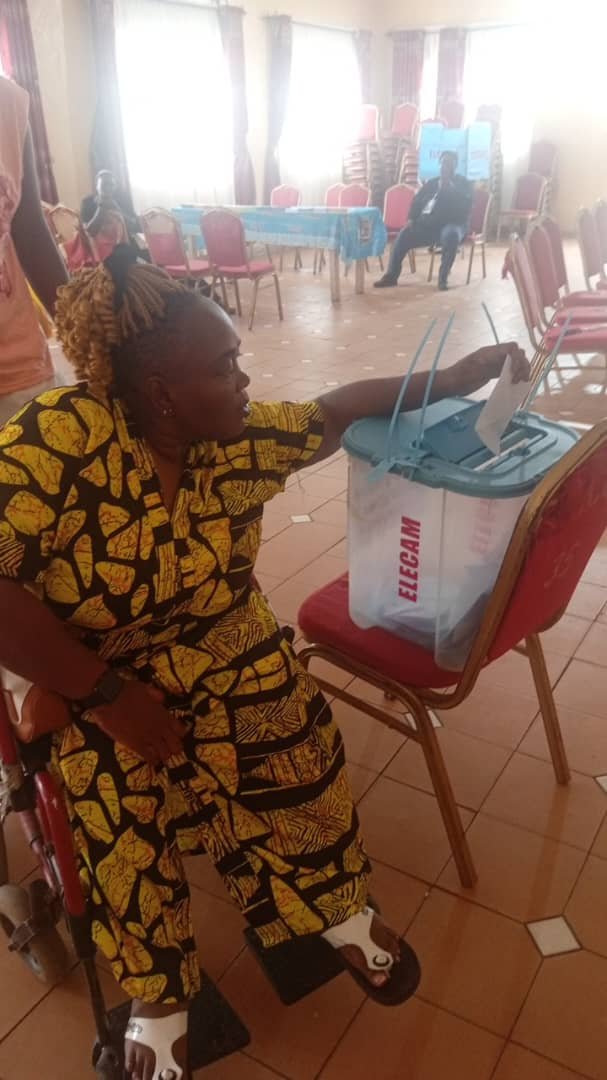By Princeley Njukang
Disabled voters in Cameroon have expressed disappointment in what they call an exclusive presidential election. In videos and interviews that surfaced after Sunday’s vote, they say the election management body, ELECAM, failed to keep its promise of making the process inclusive.
“I had to trouble other electors to carry me upstairs just so I could vote,” Jean Pierre Fopa, a mobility-impaired voter in Douala, said, describing the process as undignified. He said they had pleaded with ELECAM to ensure that their polling stations were located on the ground floor so that access could be easy. “Normally, a person with a disability is not supposed to vote upstairs,” he said.
Cameroon’s 2010 Law for the Promotion and Protection of Persons with Disabilities mandates all public buildings, including those constructed before the enactment of the law, to be made accessible to PWDs. But despite years of advocacy, most buildings across the country remain without ramps, making access for PWDs an Achilles’ heel.
Judith Eyong, a disability rights advocate who lives with a mobility impairment, says systemic issues like this contributed to the non-inclusiveness of the election. Speaking to DNA prior to voting day, she said, “Elections in Cameroon have never been inclusive.” At the time, she had recommended that voter lists be posted at a height that allows wheelchair users and those with dwarfism to access them with ease.
But Laopoldine Nouguep, a lady with dwarfism in the South, says such calls fell on deaf ears. “I was very disappointed this year when I got to the polling station. The ballot box was right up; the polling booth… accessibility was very difficult,” she says. She added that if it was as difficult everywhere, then she is not sure that many people with dwarfism were able to brave through the stigma of it.
Innovation Without Implementation: The Tactile Jacket Debacle
ELECAM had initially communicated that measures had been taken to ensure that disabled voters participate in the election in the most autonomous and dignified manner possible. The measures, it said, included the introduction of tactile jackets, aimed at ensuring that voters with visual impairments could vote independently.
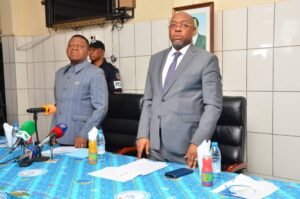
Although the jackets were announced less than a month to the election, disability leaders engaged in a robust, albeit urban, sensitization campaign to bring visually impaired voters up to speed.
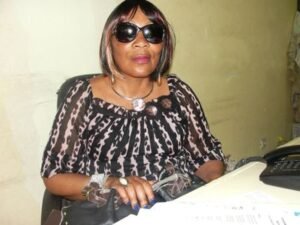
“After going everywhere to explain how it is used, we get to polling stations and not only are we not given, when we protest they have to search and search before eventually giving us,” Odette Juimo, one of Cameroon’s pioneer councilors with visual impairment, told DNA from Yaoundé. “I got into the polling booth and was surprised that the tactile jacket of my preferred candidate didn’t have a ballot paper. I had to go out and protest,” she added, revealing that she ended up seeking the assistance of her guide.
This reporter, himself visually impaired, asked to use the jackets and was told they hadn’t been brought along because ELECAM wasn’t aware that he would be voting at Bilingual Grammar School (BGS) Molyko, one of the largest polling centers in Buea. He asked to use Braille ballots—a measure ELECAM introduced in 2018—but was not given either.
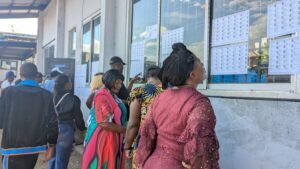
DNA toured six polling centers in Buea and reached out to several journalists and voters with disabilities across Cameroon, confirming the unavailability of the inclusive measures ELECAM had touted in most polling centers. A source close to ELECAM told DNA that tactile jackets had been provided in what she called pilot polling centers. However, when ELECAM announced the jackets on September 17, it didn’t say their deployment was going to be limited. In almost all polling stations visited, there was no sign language interpreter.
Nearly 34,000 PWDs were registered to vote, according to ELECAM. PWD leaders have since questioned why the body didn’t use the data to inform the provision of voting material.
According to Cameroon’s Electoral Code, voting is a secret act. Put differently, the code says that whom one votes for is supposed to be known solely to the voter. Yet for disabled voters, this provision of the law is frequently violated. “I went to this polling station and they asked me whom I wanted to vote for. I told them, but as a blind man, I cannot know whether my choice was respected,” Akoh Henry, a disability leader, said. He was one of the persons who campaigned for ELECAM to put in place inclusive voting measures.
Speaking prior to October 12, he said that although Article 105 of the Electoral Code allows people like him to seek third-party assistance, it failed to account for a context where vote buying and dishonesty are prevalent. And so, when ELECAM made public a series of measures it was going to take to ensure the inclusivity of the vote, he was elated. Now, he says he is “disappointed at how it all played out.”
“Since 2010 that we have been advocating, this is unacceptable,” Fopa, one of the first election inclusion advocates in the country, says, visibly bitter.
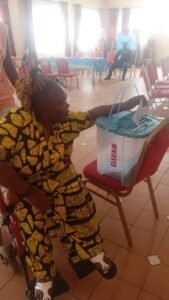
DNA has verified videos of disabled voters voting without provisions for privacy. In one of the videos, a voter is guided into a corner by someone holding ballot papers and an envelope. She insists on going at it independently but is told that the material she needs is not available. After protesting calmly, she surrenders and tells the guide whom she wants to vote for. The guide, unsure which color the candidate’s ballot is, walks away to ask another person before eventually coming back. This reporter had a similar experience.
“It means that by the time she leaves the polling station, her choice has been broadcast for everyone to know,” Princely Kesah, Founder of the Foundation for the Inclusion and Empowerment of Persons with Disabilities (FIEPWD), tells DNA. “And at a time when tensions are high, the consequences for her could be dire.”
Insecurity, Rights, and the High Cost of Exclusion
The presidential election of October 12, 2025, in which 12 candidates, including 92-year-old incumbent Paul Biya, contested, was held against a backdrop of insecurity. In Cameroon’s North West and South West Regions, separatist fighters who have been fighting since 2017 to create a breakaway state banned the election and imposed a month-long lockdown, although thousands of voters defied it to cast their votes. Kesah says to have denied disabled voters privacy in such a security context is “tantamount to offering them for slaughter.”

Cameroon’s Ministry of Social Affairs reports that over 3.48 million Cameroonians live with at least one form of disability. Of this population, nearly one million are of voting age. It is not the first time PWDs are voicing frustrations about the non-inclusive nature of the electoral process. In 2022, Sightsavers published a study in which it documented several degrading treatments that it argued discourage the political participation of PWDs.
Charley R. Nugap, Associate Professor of Special Needs and Inclusive Education at the University of Buea, says by failing to make the election inclusive, ELECAM has proven that it doesn’t value PWDs. “Inclusion is a right and not a choice,” he says.
DNA reached out to ELECAM for an official statement but didn’t hear back. It is unclear whether the body plans to conduct an accessibility audit of the presidential election or even release a statement about it.
This story was produced with assistance from Election Newsroom Cameroon, a UNESCO supported project.
